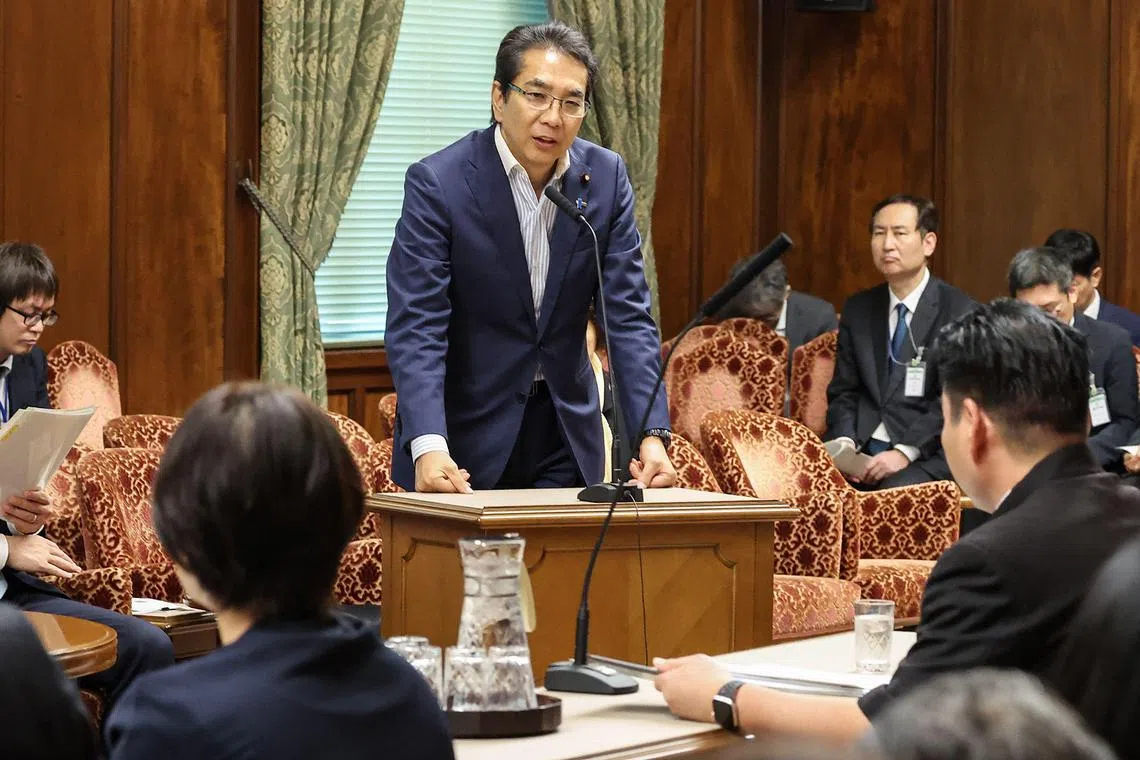Japanese farm minister resigns following gaffe over rice
Sign up now: Get ST's newsletters delivered to your inbox

Mr Taku Eto apologised on May 19 after saying he had “never had to buy rice” thanks to gifts from supporters.
PHOTO: AFP
Follow topic:
TOKYO - Japanese Agriculture, Forestry and Fisheries Minister Taku Eto resigned on May 21 after remarks he made this week about rice triggered a firestorm of criticism from voters and lawmakers, posing a fresh challenge to Prime Minister Shigeru Ishiba’s embattled government.
Mr Eto has been in hot water this week since media reports exposed comments he made at a political fund-raising party on May 18 that he had “never had to buy rice”,
The comment led to a frenzy of criticism from voters, already angry about the historically high price of the staple food due to a poor harvest and elevated demand from a boom in tourism.
“I made an extremely inappropriate remark at a time when citizens are suffering from soaring rice prices,” Mr Eto told reporters after handing in his resignation at the Prime Minister’s Office.
Mr Ishiba appointed former environment minister Shinjiro Koizumi as his replacement at the Ministry of Agriculture, Forestry and Fisheries (Maff), saying he was counting on his reform-minded stance to produce results.
“Mr Koizumi is someone who has experience, insights, and passion for reforms on agriculture and fisheries,” Mr Ishiba said.
The doubling of rice prices from a year ago to multi-decade highs has become a top concern for Japanese voters, long resigned to years of deflation and suffering from stubbornly low inflation-adjusted wages.
The government has taken steps since March to tame prices by releasing rice from its emergency stockpile but to little avail so far.
Data on May 19 showed retail prices rising again in the week through May 11 after falling for the first time in 18 weeks.
That has increasingly led to retailers and consumers seeking out cheaper, foreign rice.
‘Minister of rice’
“What’s on everyone’s mind right now are the soaring rice prices and anxiety over whether there’s enough of it in the market, and I want to dispel these concerns,” said Mr Koizumi, whose father Junichiro pushed through sweeping reforms and deregulation as prime minister in the 2000s.
“(Maff) covers a wide range of responsibilities, but, in my mind, what I need to focus on right now is simply rice.
“I’m going into this job with the mindset that I am essentially the ‘minister in charge of rice’,” Mr Koizumi said.
Mr Koizumi, who previously served as the head of the Liberal Democratic Party’s (LDP) agriculture and forestry division, said there would be no sacred cows in his efforts to lower rice prices, and that a strong political will would be needed to achieve those goals.
Rice farmers are traditionally a strong support base for the long-governing LDP, and Japan protects the rice market with hefty levies beyond the tariff-free “minimum access” quota agreed under World Trade Organisation rules.
Mr Eto’s departure threatens Mr Ishiba’s already shaky grip on power ahead of key Upper House elections in July.
His LDP and its coalition partner Komeito lost their majority in the more powerful Lower House in a snap election Mr Ishiba called in October
Many users on social media expressed disdain over the latest saga.
“Reaffirmed the need for the LDP to be completely annihilated,” one user wrote on X, sharing the belief that Mr Koizumi would do no better than Mr Eto.
Mr Eto’s resignation is the first exit from Mr Ishiba’s Cabinet, excluding ministers who had lost their seats in those elections.
“Minister Eto’s resignation was inevitable from the moment the gaffe occurred,” said Professor Hiroshi Shiratori, a political science professor at Hosei University in Tokyo.
“The decision to replace him only after five opposition parties had planned their no-confidence motion was too slow, exposing Prime Minister Ishiba’s lack of leadership.”
A Kyodo News opinion poll on May 18 showed support for Mr Ishiba at a record low 27.4 per cent, with nearly nine out of 10 voters dissatisfied with the government’s response to soaring rice prices. REUTERS

